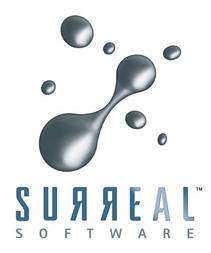Surreal Software
 | |
| Subsidiary of Warner Bros. Interactive Entertainment | |
| Industry |
Interactive entertainment Computer and video games |
| Fate | Merged into Monolith Productions |
| Successor | Monolith Productions |
| Founded | Seattle, Washington, USA (1995) |
| Defunct | 2010 |
| Headquarters | Kirkland, Washington, USA |
Key people |
Alan Patmore, co-founder and studio head Stuart Denman, co-founder and studio technology director |
| Products | Video games |
| Owner | Time Warner |
| Parent | Warner Bros. Interactive Entertainment |
| Website | www.surreal.com |
Surreal Software was a video game developer based in Kirkland, Washington, USA, and a subsidiary of Warner Bros. Interactive Entertainment, known for The Lord of the Rings: The Fellowship of the Ring, The Suffering and Drakan series. Surreal Software employed over 130 designers, artists, and programmers. Surreal was acquired by Warner Bros. Games during the bankruptcy of Midway Games in July 2009. After a significant layoff in January 2011, the remaining employees were integrated into WBG's Kirkland offices, along with developers Monolith and Snowblind.
Surreal Software's technical capabilities increased, with the advancement of multi-platform offerings, and a proprietary real-time game development engine. The studio last worked on This Is Vegas, a title which was scheduled to be released on Xbox 360, PlayStation 3 and PC.[1] The first screenshots, video and game information for This Is Vegas were unveiled the week of February 4, 2008 at IGN.[2]
History
Surreal Software was founded in 1995 as an independent video game development studio by Alan Patmore, Stuart Denman, Nick Radovich and Mike Nichols. Patmore, Nichols and Radovich attended Eastside Catholic High School in Bellevue, Washington together.[3] They found Stuart Denman, a University of Washington grad, through an online message board. The group began operating in 1995 in an office in Seattle's Queen Anne neighborhood. Previously, Radovich sold real estate, Patmore worked at a wireless company, Nichols was working at local game company Boss Studios, and Denman had just interned at Microsoft on the Excel team.
Their first contract was with Bothell-based children's game developer Humongous, which found Denman's website and called to recruit programmers for Humongous. Surreal instead offered to do contract work. Surreal developed the Riot Engine for its games in 1996. First receiving critical acclaim with the 1999 release of Drakan: Order of the Flame,[4][5] Surreal Software continued its success with Drakan: The Ancients' Gates in early 2002, both games selling in excess of 250,000 units. Having grown to two development teams, Surreal released The Lord of the Rings: The Fellowship of the Ring later that same year, selling over 1.8 million units.
In March 2004, Surreal Software released The Suffering,[6] an original concept action-packed horror game set in a secluded island prison, with monster designs by Stan Winston. Gamers and critics alike enjoyed this bold new contribution to the horror genre and in 2005, The Suffering: Ties That Bind followed.[7] In April 2004, Midway Games acquired Surreal Software as an in-house game studio.[8] This was the only studio that kept its original name following its acquisition by Midway in 2004 In 2006, the Surreal Software staff moved from Fremont to their new waterfront studio on Elliott Avenue next to the Olympic Sculpture Park. In 2009, Surreal Software was among the Midway Games assets purchased by Warner Bros. Interactive Entertainment. In 2010, the company was merged into the nearby studio Monolith Productions.
Founders
All of the founders had left the company prior to its merging with Monolith.
- Stuart Denman — Technical Director
- Alan Patmore — Project Director
- Nick Radovich — Business Operations
- Mike Nichols — Art Director
List of games
| Year | Title | Platform(s) | ||
|---|---|---|---|---|
| PS2 | Win | Xbox | ||
| 1999 | Drakan: Order of the Flame | No | Yes | No |
| 2002 | Drakan: The Ancients' Gates | Yes | No | No |
| 2002 | The Lord of the Rings: The Fellowship of the Ring | Yes | Yes | No |
| 2004 | The Suffering | Yes | Yes | Yes |
| 2005 | The Suffering: Ties That Bind | Yes | Yes | Yes |
Canceled
- The Lord of the Rings: The Treason of Isengard
- This Is Vegas
References
- ↑ Midway Press Release: GC 2008: Midway Promises Show Line-Up with Extra Punch and Two European Premieres
- ↑ IGN.com: Games, Cheats, Movies and More
- ↑ "A Surreal Seattle approach to producing video games". The Seattle Times. March 18, 2002.
- ↑ J. C. Herz (August 12, 1999). "GAME THEORY; The Feel of Cinema, but a Game at Heart". New York Times.
- ↑ Stuart Denman. "Postmortem: Surreal Software's Drakan: Order of the Flame". Gamasutra.
- ↑ Richard Rouse III. "Postmortem: The Game Design of Surreal's The Suffering". Gamasutra.
- ↑ Jeremy Dunham. "Original PS3 IP From Surreal". IGN.
- ↑ Midway Press Release:PR 2004-04-06 A
External links
- Official Surreal website
- Official WB Games website
- Career page
- GDC 08 Interview - This Is Vegas
- Drakan interview
- Screenshots and video clips from The Suffering: Ties That Bind
- GameSpot interview
- Stuart Denman's Game Development Blog